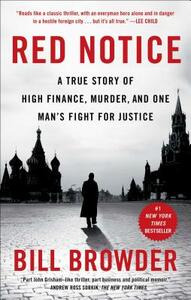Take a photo of a barcode or cover
1.01k reviews for:
Red Notice: A True Story of High Finance, Murder, and One Man's Fight for Justice
Bill Browder
1.01k reviews for:
Red Notice: A True Story of High Finance, Murder, and One Man's Fight for Justice
Bill Browder
I had no idea what to expect when I started this book. I had glanced at the cover, liked it, and did not realize it was non-fiction. It is sort of a memoir of Bill Browder, the man at the helm of the Hermitage Fund, who pioneered investing in Russia. The off-handed way that he mentioned jetting off to luxury vacations, visiting the most expensive houses in the world, etc., came off as a bit annoying, but the story of how he "took on" the Russian oligarchs was intriguing. Throughout the book, he seemed to have a love-hate relationship with Russia. Overall, the book was interesting, but not the "high finance, murder, and . . . fight for justice" I expected.
Could not put this one down! A writer he is not, but it’s like having your friend tell you their u believable story in terms that I could understand (I know n
NOTHING about finance and investing, etc). Really learned a lot and enjoyed this.
NOTHING about finance and investing, etc). Really learned a lot and enjoyed this.
I felt that the book was oddly weighted. The interesting part didn't start until more than halfway through the book. The first part could have been cut in half.
Магнитски е руски адвокат, който службите на Путин убиват в затвора затова, че се опитва да разкрие и разгласи невижданата корупция по високите места във властта на Русия.
Напоследък у нас бая се говори за "закона Магнитски", само че никой като че не знае кой е тоя Магнитски и защо американците имат закон на негово име. Всъщност, всичко тръгва от бизнесмена Бил Баудър, който още по времето на мутренските години се захваща да инвестира в руската приватизация (подобна е на нашата, с бонове) като създаде хедж-фонд, чрез който хора на Запад могат да инвестират в Русия.
Нещата потръгват добре, фондът става мултимилионен, но сблъсъците на Баудър с руската действителност постепенно си надигат главата - колкото повече пари се въртят, толкова по-голям интерес към тях има от всякакви... кръгове. Кръгове, на върха на които стои самият Путин и цялата държавна машина е впрегната да им служи.
Книгата е написана в безпардонен стил и показва без излишни литературности събитията около борбата на Баудър с различни корумпирани служители, кръгове и кръгчета и накрая как един от адвокатите му - Сергей Магнитски бива арестуван, тормозен по арестите и накрая пребит до смърт, защото не знае да си затваря устата и/или навреме на избяга от Русия.
Показва също действителността на руската икономика и политика, неразривно свързани в някакъв вид индустриален клиентски феодализъм, който не позволява нищо икономическо да покълне в тая прокълната почва.
И накрая, показва действителността на американската политика и как демократите (по времето на Обама и лично той) с тяхната "успокоителна" политика спрямо Русия и Путин са същите като Чембърлейн и "успокоителната" му политика спрямо Хитлер.
Напоследък у нас бая се говори за "закона Магнитски", само че никой като че не знае кой е тоя Магнитски и защо американците имат закон на негово име. Всъщност, всичко тръгва от бизнесмена Бил Баудър, който още по времето на мутренските години се захваща да инвестира в руската приватизация (подобна е на нашата, с бонове) като създаде хедж-фонд, чрез който хора на Запад могат да инвестират в Русия.
Нещата потръгват добре, фондът става мултимилионен, но сблъсъците на Баудър с руската действителност постепенно си надигат главата - колкото повече пари се въртят, толкова по-голям интерес към тях има от всякакви... кръгове. Кръгове, на върха на които стои самият Путин и цялата държавна машина е впрегната да им служи.
Книгата е написана в безпардонен стил и показва без излишни литературности събитията около борбата на Баудър с различни корумпирани служители, кръгове и кръгчета и накрая как един от адвокатите му - Сергей Магнитски бива арестуван, тормозен по арестите и накрая пребит до смърт, защото не знае да си затваря устата и/или навреме на избяга от Русия.
Показва също действителността на руската икономика и политика, неразривно свързани в някакъв вид индустриален клиентски феодализъм, който не позволява нищо икономическо да покълне в тая прокълната почва.
И накрая, показва действителността на американската политика и как демократите (по времето на Обама и лично той) с тяхната "успокоителна" политика спрямо Русия и Путин са същите като Чембърлейн и "успокоителната" му политика спрямо Хитлер.
So, THAT's the Magnitsky Act. Yeah, this raises many more questions about the meeting at Trump Tower with the Russian lawyer. I question if the discussion was about adoptions. (To clarify, adoptions were probably a part of it, but I doubt the whole of it.) I also understand why Putin was so happy about the Saudi government's killing of The Washington Post reporter Jamal Khashoggi -- Putin lost and lost face with regards to Magnitsky, and the press and media played a large part in his loss. (Putin, no doubt, wishes he could orchestrate large numbers of killings amongst the press.) Ever a good Russian thug, Putin won't forget; he needs to win against his enemies. So, it is not far fetched- at all- that Russia was focused on interfering with the 2016 U.S. election and is probably setting sights on the 2020 election. Putin has a score to settle with Obama and the U.S. government that signed the Magnitsky Act into law allowing the banning of visas to the U.S. and confiscation of U.S.-based assets for the Russian government thieves who orchestrated Magnitsky's death. Now there is Trump. While Obama wanted a reset with Russia to improve relations (yes, quite questionable and probably misguided), Trump is simply a sycophant to Putin, making Trump dangerous to national security. I write this today, 5/16/2020, as Trump has fired the State Department Inspector General, the latest of independent governmental watchdogs fired by Trump. I am not a conspiracy theorist (probably what all conspiracy theorists say, I know); however, after reading the why of the Magnitsky Act, there are questions and serious need for caution in accepting Trump's cheerleading for a closer U.S. relationship with Russia.
Important read, though the story is told by an interested party.
I decided to read this book after hearing Browder speak on NPR. The story sounded like it would be fascinating and be an important story to know. The book didn't disappoint in that respect.
The first third of this book is about Browder's early career and how he built Hermitage Capital and his other companies. This part of book wasn't really necessary to the story. Browder could have summarized the necessary information in one or two chapters and not spent a third of the book on it.
The information about how Browder and his employees took on the Russian government was great! That part was one of those times I didn't want to put my book down despite the fact that I knew how the story would end (this was due to the NPR interview). The second half of the book is worth the read - if you are tempted to stop reading just skip to the second part.
At times it felt a little big like Browder was showing off. There are multiple times in the book where Browder mentions how he eats at top restaurants and his lavish vacations. This combined with the fact that Browder mentions how he is losing money by pursuing human rights violations annoyed me. Someone who is truly pursing human rights violations to do good in the world shouldn't mention how he is losing money because of it.
Nonetheless, the book is still worth the read.
The first third of this book is about Browder's early career and how he built Hermitage Capital and his other companies. This part of book wasn't really necessary to the story. Browder could have summarized the necessary information in one or two chapters and not spent a third of the book on it.
The information about how Browder and his employees took on the Russian government was great! That part was one of those times I didn't want to put my book down despite the fact that I knew how the story would end (this was due to the NPR interview). The second half of the book is worth the read - if you are tempted to stop reading just skip to the second part.
At times it felt a little big like Browder was showing off. There are multiple times in the book where Browder mentions how he eats at top restaurants and his lavish vacations. This combined with the fact that Browder mentions how he is losing money by pursuing human rights violations annoyed me. Someone who is truly pursing human rights violations to do good in the world shouldn't mention how he is losing money because of it.
Nonetheless, the book is still worth the read.
Fascinating high crimes about the Russian govt. Hard to believe it was true.
Wow! This account of Bill Browder’s life as a hedge fund manager in Russia and the corruption there that culminated in the murder of his tax lawyer Sergei Magnitsky and his attempt to get justice in the face of rampant criminality and corruption at all levels of Russian government is riveting. It reads more like a thriller novel than non-fiction but many of the events recounted, I remember reading about in the news. I really want to read Freezing Order now! I can’t wait to discuss it with my TexPat book group, a few of whom have lived in Russia.


